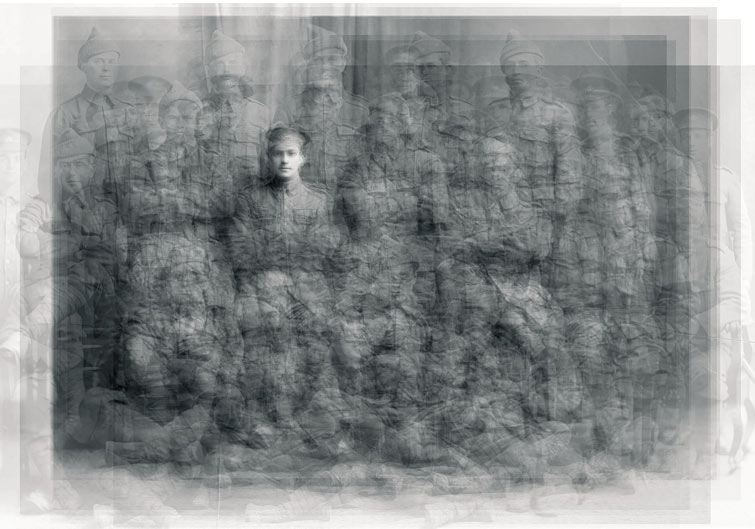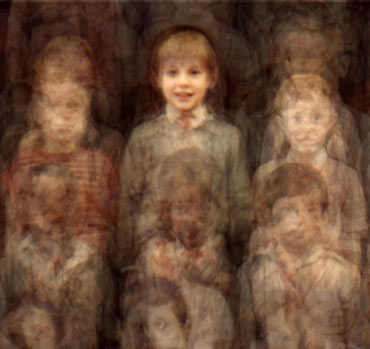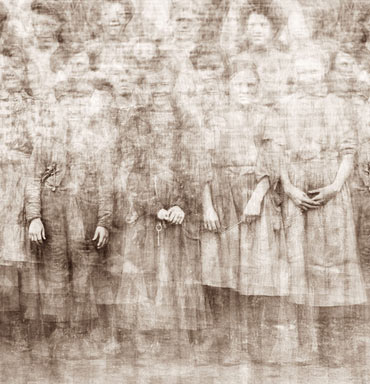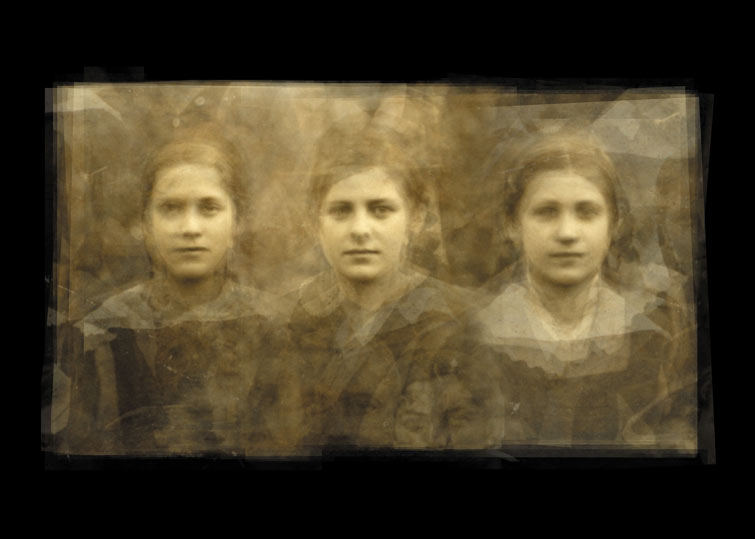Grzegorz Rogala “Mothers, Sisters, Fathers” 6.09 – 11.10.2008
September 6, 2008 10:38 pm |
|
| Looking at Grzegorz Rogala’s (Poland, 1956) photographs, we are absorbed by their pervasive anxiety that is not visible at first glance. So, what hidden anxiety resides in his pictures, reminding us of distant-past frescos on crumbling walls, photographs faded in the sun or pictures from an old family album? When we take a closer look, we notice that these are not simply recreations of old photographs, but that Rogala’s use of previously existing photographs creates new images with new meanings and metaphors. The images have something of a movie, watched not frame by frame, scene by scene, but in a point-wise, rather than linear, manner. All the scenes overlap and are presented at the same time; the distinction between what was before and after becomes pointless.
The anxiety becomes manifest with the effect of applied artistic method, resulting in suspension of the clock-time logic we are used to and that lays claim to absoluteness. Movement from one image to another is restoration of the linear experiencing of time; normality. However, stopping at an image and entering it removes this “normality”, replacing it with the unsettling experience of point-wise time logic. The attempt to invoke another time experience for the voyeur is not only an artistic measure subject to the need of formal innovation, but the translation of the inner time experience into the means of the visual language. It becomes credible when the voyeur not only gazes at and surrenders to the visualised experience of duration, timelessness and time condensation, but begins to remember his own experiences of being “out of time.” |
|
 |
 |
| Kijkend naar de foto’s van Grzegorz Rogala (Polen, 1956), bekruipt ons een, in eerste instantie onpeilbaar, angstgevoel. Wat voor verborgen ongerustheid schuilt er dan in zijn foto’s die ons doen denken aan oude fresco’s op afbrokkelende muren, foto’s vervaagd door de zon of uit een oude familie album? Als we nader kijken, zijn het niet slecht recreaties van oude foto’s; Rogala’s gebruik van bestaande foto’s creëert nieuwe beelden met nieuwe betekenissen en metaforen. De beelden hebben iets van een film, niet zozeer frame per frame, scène per scène, eerder op een puntsgewijze, in plaats van een lineaire manier. Alle scènes overlappen en worden tegelijkertijd gepresenteerd; de distinctie tussen wat er was en wat er komt wordt onbelangrijk. Die ongerustheid wordt zichtbaar door middel van het effect van de toegepaste artistieke methode, resulterend in het opheffen van de “klok-tijd logica” waar we aan gewend zijn geraakt en die aanspraak maakt op de absoluutheid van tijd. Gaan we van één beeld naar een andere, dan herstellen we de lineaire ervaring van tijd; normaliteit. Stoppen we bij een beeld en treden we binnen echter, dan wordt deze “normaliteit” vervangen door de onrustige ervaring van “puntsgewijs-tijd logica”.De poging om een andere tijdservaring voor de kijker op te roepen is niet alleen een artistieke drang naar formele innovatie, maar de vertaling van innerlijke tijdservaring door middel van visuele taal. Het wordt aannemelijk wanneer de recipiënt niet slechts kijkt naar, en zich onderwerpt aan, de gevisualiseerde ervaringen van tijdsloosheid, duur en tijdscondensatie, maar wanneer hij zich zijn eigen ervaringen van “uit de tijd stappen” begint te herinneren… | |
 |
|
| Grzegorz Rogala – CV Born 1956. Studied Cinematography at PWSF Tv i T in Lodz, Poland. Member of Polish Filmmakers Society, Polish Society of Fine Arts. From 1988 owner of “Studio Rogala”, film production and postproduction company in Warsaw. Produced or took part in production of over 800 commercials and feature films. In !996 rewarded first prize, animation category, Crackfilm, Krakow. Several works in collection of National Museum, Warsaw. From 2007 leads, with Jozek Piwkowski, gallery 2b+r in Warsaw www.studiorogala.comFilmography: The line -1981, AWARED FIRST PRIZE FOR THE BEST EXPERIMENTAL FILM, IFF, MUNICH Prussian Officer, 1981, DOP Kinolino – 1983 Labyrinth – 1986 Backyard Madonnas – 2000 Steps – 2007 Desire – 2007 Bench – 2007 Elevation -2008 Fairy – 2008 Nine steps in Morocco – 2008 Sunday – 2008 Trace – 2008 Time difference – 2008 Candlelight – 2008 Glance – 2008Exhibitions: 2005- “Backyard Madonnas” – with Joanna Krzyszton, Warszawa 2006 – “Time-Space” – with Joanna Krzyszton, Warszawa 2006 “ Easter Banners” – Collective exhibition, Podziemie Kamedulskie, Warszawa 2006-2007 “ Icons of freedom” Collective exhibition, Warsaw, Lodz, Radom 2007 – “Time” – Slowacki Theatre, Krakow 2007 – “Time 2”- Test gallery, Warsaw 2007 – “Best graphics of 2006” – Collective exhibition, Test gallery, Warsaw 2007 – “Veronica’s veil” Collective exhibition, Podziemie Kamedulskie, Warsaw 2007 – “Light whistling” – performance, Pokaz gallery, Warsaw 2007 – Collective exhibition, Piotrkow Trybunalski 2007 – “REWIZJE” – Collective exhibition, Warsaw 2008 – “Time 3”, – Gallery Kalisz 2008 – “Moving Pictures” – Pokaz gallery, Warsaw 2008 – “Moving Pictures” – video Art festival, Athens, Grece 2008 – “Elevation” – IFF, Mumbay, India 2008 – “21 Internatinal Poster Biennale” Collective exhibition, Warsaw 2008 – “Arts uprising” Collective exhibition, Radom 2008 – “Photographer” – GalleryWM, Amsterdam, Holland 2008 – “Time4”. Pokusa gallery, Wiesbaden, Germany 2008 – “Photographer 2” – Museum of photography, Bydgoszcz |
